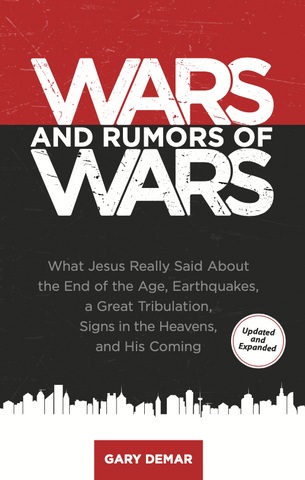Gary discusses the history of speculation and the baseless theories of those saying they interpret the Bible “literally.”
What’s true of sun, moon, and stars, representing the nation of Israel, is also true of “the powers of the heavens [that] will be shaken.” With this type of language, “God is redrawing the map of world politics, and the familiar structures of international affairs will never be the same again.” The power structures of the Old Covenant were about to pass away and the existing political order. This power struggle begins when Jesus was brought before the religious and secular powers of the day and the people chose Barabbas and Caesar over Jesus (Matt. 27:16-21; John 19:15). This confrontation continues in the book of Acts. Peter and John are arrested (Acts 4:3). Stephen is stoned to death (7:54-60). Paul and his compatriots are accused of “upset[ting] the world” and “acting contrary to the decrees of Caesar, saying that there is another king, Jesus’” (Acts 17:6-7). The book of Acts ends with Paul “peaching the kingdom of God, and teaching concerning the Lord Jesus Christ, with all openness, unhindered” (28:31; also v. 23 and 20:25).
We can gain an understanding of what this shaking means by following the Bible, particularly Haggai 2:6-7 and Hebrews 12:22-24. The writer of Hebrews explains, first, by telling his first readers, “you have come to Mount Zion and to the city of the living God, the heavenly Jerusalem, and to myriads of angels, to the general assembly and church of the firstborn who are enrolled in heaven, and to God, the Judge of all, and to the spirits of the righteous made perfect, and to Jesus, the mediator of a new covenant, and to the sprinkled blood, which speaks better than the blood of Abel” (12:22-24).
There is no longer any need for earthly Mount Zion or the city of Jerusalem as redemptive centers (Gal. 4:21-31). These first Christians (first fruits) —new creatures in Christ (2 Cor. 5:17)— had come to “the heavenly Jerusalem” and were at that moment “enrolled in heaven” (cf. Eph. 1:20; 2:6) where that Jerusalem will never be attacked or its temple dismantled because “the Lord God the Almighty and the Lamb are its temple” (Rev. 21:22). The same is true of the sun and moon. “And the city has no need of the sun or of the moon to shine on it, for the glory of God has illumined it, and its lamp is the Lamb” (21:23). Theirs is a “new covenant” (Heb. 8:7-13) based on the heavenly Jerusalem (City of Peace) where there is perpetual peace.

Wars and Rumors of Wars
A first-century interpretation of the Olivet Discourse was once common in commentaries and narrative-style books that describe the fall of Jerusalem in AD 70. There is also a history of skeptics who turn to Bible prophecy and claim Jesus was wrong about the timing of His coming at “the end of the age” and the signs associated with it. A mountain of scholarship shows that the prophecy given by Jesus was fulfilled in exacting detail when He said it would: before the generation of those to whom He was speaking passed away.
Buy NowWith the April 8 eclipse looming, Bible prophecy and end-times speculators are feeding the newest end-of-the-world frenzy. Gary discusses the history of speculation and the baseless theories of those saying they interpret the Bible “literally.”

